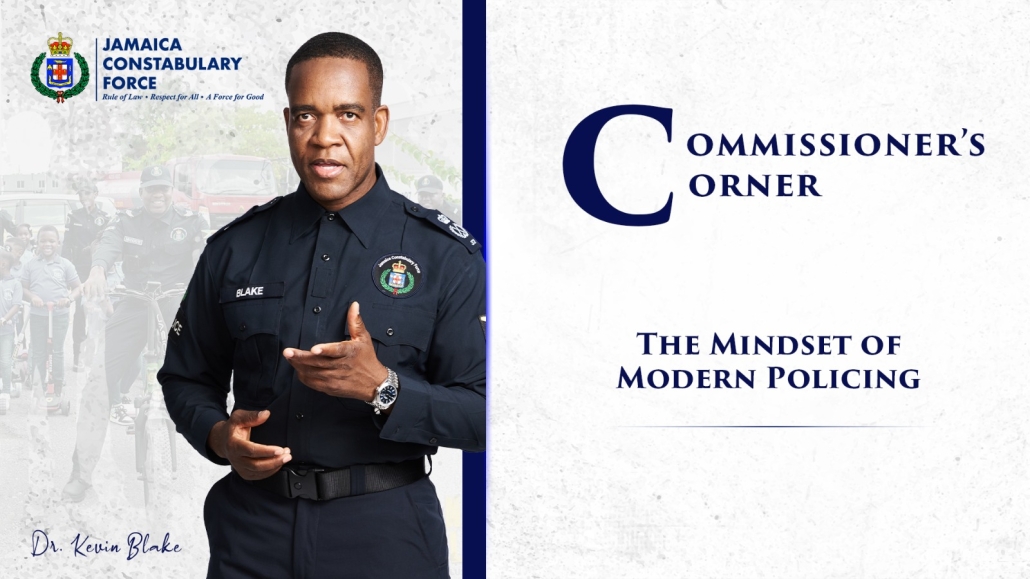
The Mindset of Modern Policing
Across the Global South, public institutions frequently struggle with deep-seated issues of inertia, legitimacy, and outdated practices. When transformation does occur, it is often driven by external pressure from donor agendas, international benchmarks, or public outcry. In rare instances, however, change emerges from within, shaped by a conscious and collective decision to evolve. The Jamaica Constabulary Force (JCF), under the leadership of Commissioner Dr Kevin Blake, is offering one such case study. It is an unfolding narrative of internal transformation grounded in deliberate mindset shifts, quality assurance, and transparent engagement.
Launched simultaneously last night inside Kingston’s National Arena and the Montego Bay Community College, Transformations Expo 2.0 is not presenting an aspirational vision for the future. It was a declaration of present realities. “None of what we are exhibiting is aspirational… everything that they see, touch and feel is all happening now, in real time, across the ranks and formations of the Jamaica Constabulary Force,” wrote Commissioner Blake. Such a statement reflects a level of institutional confidence that is worthy of analysis. It also signals a structural shift in how the JCF sees itself; not as a reactive body defined by crime rates, but as a forward-facing institution defined by systems, strategy, and self-awareness.
This week’s Commissioner’s Corner, serves as a window into the ethos being cultivated within the Force. At the heart of this ethos is a commitment to the foundational belief that transformation is not a policy document but a lived experience. “We have deliberately embarked upon the journey of taking us from who we were to who we have become, still pushing forward into becoming who we are supposed to be. It is driven by vision, sustained by courage, and accomplished through the determination to reach a higher, more purposeful end state.”
This internal orientation is critical. Public sector institutions often create systems and processes in response to external crises or political directives, quickly losing sight of their original intent. Over time, these systems become performative, no longer aligned with the outcomes they were designed to achieve. The JCF is intentionally disrupting that cycle. The Force’s embrace of ISO 9001 certification is a case in point. It reflects a broader commitment to service quality, operational efficiency, and sustained institutional credibility. “We have come a far way, and have continued to raise the bar of the quality of service we deliver to the people, through our ISO 9001 certified Quality Management System, professional accreditation, and a renewed focus on service excellence.”
The transformation is as much cognitive as it is operational. “It is in our minds that transformation has to begin. We must be transformational in our thinking and our perspectives,” the Commissioner wrote. This cognitive reorientation anchors the JCF’s modernisation in the most critical site of institutional change; the people. It is also why the Expo showcased internal innovations rather than imported technologies. The exhibits reflected not external procurement but internal capacity. In so doing, the JCF is making a compelling argument that local solutions can meet local challenges when supported by strong leadership and organisational clarity.
Critically, the Commissioner’s reflections are clear indication that JCF also recognises the strategic value of public trust. In an era of disinformation and cynicism toward State institutions, transparency is no longer optional. “If we fail to be open and transparent, then the story that we refuse to tell will be replaced by a story that is not ours, and it usually is not complimentary to us, nor true.” This is not a defensive statement. It is an assertion that institutional credibility must be built proactively, through consistent engagement and visible accountability.
The intellectual turn within the JCF is also noteworthy. In highlighting the JCF Mensa Lecture Series, Commissioner Blake is symbolising a departure from traditional narratives of policing. “The most powerful weapon in policing is not the brawn, but rather the brain.” That statement challenges both internal culture and broader public expectations. It signals that the JCF understands modern security challenges require more than muscle. They demand strategy, foresight, and continuous learning. Through forums like the Mensa Series, the Force is embedding this philosophy into its organisational DNA.
For the first time in its history, the JCF is narrating its own change. By inviting the public into this journey, through open events like the Expo, and by encouraging members to include their families, the transformation becomes relational. In that regard, it is a matter of cultural identity. “I encourage each and every one of you to bring your family out to the Expo… to share with them the modern cutting edge JCF of which you are a part.”
Public sector transformation, especially within the security forces of post-colonial States, is often framed as an elusive goal. The Jamaica Constabulary Force is redefining that narrative. It is placing thinking officers at the centre of its strategy. It is linking credibility with openness. It is privileging systems over slogans. In doing so, it is becoming a success story and – more importantly – a model.







